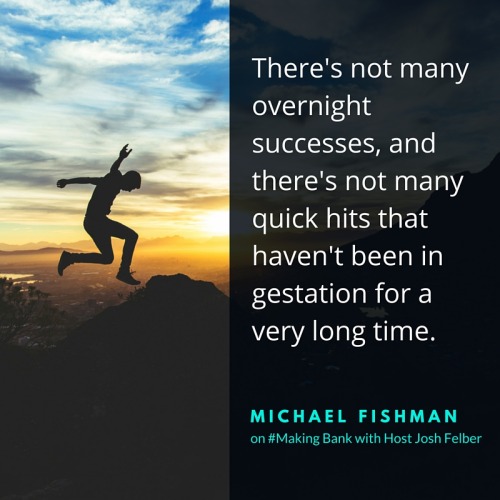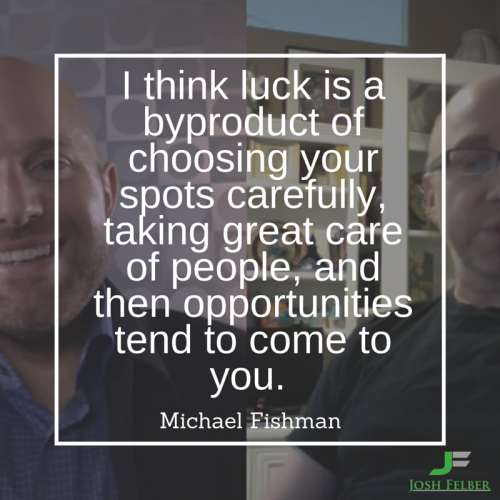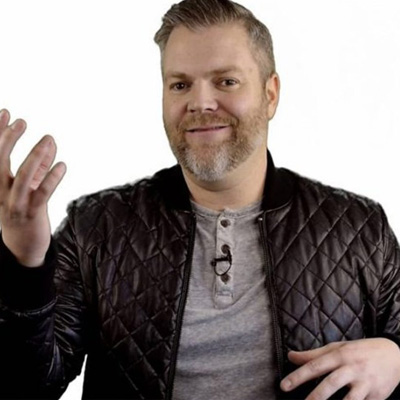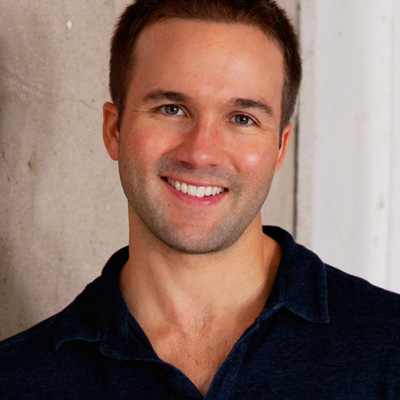The 3 Words That Define You
with Michael Fishman
Video:
Audio:
Click here to get Free Podcast on iTunes
SUBSCRIBE for weekly episodes and bonuses: bit.ly/JoshFSubscribe
MAKING BANK is now a weekly YouTube TV show and iTunes Podcast full of #Success and #Business with Josh.
Subscribe to the Podcast MP3: bit.ly/TumblrSubscribe
Subscribe to iTunes: bit.ly/JoshF_Itunes
Summary
Are you living your truth? Ask yourself, what three words really define who I am, where I live, and how I interact with others?
Defining these words will help you to understand the path you’re on. Once you’ve identified your path, think about your clarity. How clearly do you see yourself? How clearly can you identify how you want to be treated and how you want to treat others?
These are just some of questions posed by Michael Fishman, health consultant and connoisseur. In this episode of Making Bank, Michael shares how marketing language, consumer care, and work culture can be combined to help companies make the leap from competitive to dominant in their respective industries.
Listen to this week’s episode to hear Michael talk about:
· The importance of that which you do not know
· How Prevention Magazine came to be
· The power that can be derived from wits, desire, and faith
· How to leverage psychology to help people
· Life as a servant to relationships
· Why adding value to the lives of others is the easiest path to success…as Jay Abraham says, “Never wait for someone to hand you a check to help them.”
SUBSCRIBE for weekly episodes and bonuses: bit.ly/JoshFSubscribe

Transcription
Josh: I’m Josh Felber. You’re watching Making Bank on the Whatever It Takes network. Am I living my truth? Are you living your truth? In this episode we want to understand, where you have strengths and gaps, and the amount of clarity that you have in your life and your business right now. We have to really know what path we’re on, if we’re going to make a difference in what we’re doing and where we’re heading in our life. Some of the things that we want to ask ourselves are, “What are 3 words that really define who I am and where I am living? What are those 3 words, for you? How do they define you?
For myself, that’s honorable, confident and loving. I utilize that in my life, personally, to be who I am, and to live truthfully to myself. I want you to take a minute, as you’re listening to this episode today, and jot some notes down. Put down, what are your 3 words. What are 3 words that define who you are? Number 2, what are 3 words on how you interact with other people? How do you interact with others in your life? Are you present? Are you genuine? Are you open? Are you somebody that’s more closed off? More, just shies away from interacting with others. Holds back on what you have to say. That all is going to define, who you are and how clear you are with your life, with your vision and with your focus.
Myself, when I interact with others, I always want to try to stay present in that moment. I’m present with that person, I’m communicating with that person. Understanding and listening to, exactly what they’re communicating and saying. Also for myself is, genuine. Being genuine about being there with them, listening to them and understanding what they are saying. As well as open or vulnerable, trying to be open and vulnerable. For me, that’s one of my biggest challenges is, becoming open and vulnerable, when I speak and communicate with others.
Then for myself, I try to utilize stories, I try to utilize different things to become open and more vulnerable, when communicating or interacting with other people. The third thing you want to take a look at, what are 3 words that really define yourself, or that help made you successful in your life? Maybe it’s your family life, maybe it’s your personal life, as well as or your business life. Being very crystal clear and concise on these as well, will help define and create the focus on where your business is going, as well as how successful you are, in your life as well.
One of the biggest things that stands out for myself is, being relentless. Everything I do, ever since I was 14 years old, it goes back to being relentless in what I do. Continuously going after it. Not taking no for an answer, not worrying about … Fear, “Oh, is this going to be a roadblock for myself?” Just continuously being relentless in what I do. Also, as well as focused. Really, once I have what I’m going after is, being able to be focused and continue down that path towards, what that end goal is or that end project or that next movement forward.
Then for myself, the third word is, discipline. Being disciplined, to stay with it, to continue through it. When challenges come up, when you run into roadblocks or just, things may not be going your way. Being disciplined to push through that. I want you to put down those 3 words for each of those areas. In your life, how you’re living right now or how you want to be living, as well as how you’re interacting with others, and communicating and connecting with others. Then, success, how those 3 words, how they define your success, or how you want them to define your success in moving forward.
When we’re talking about clarity, and being clear and concise in what you’re doing, the definition that you can pull for clarity is, freedom from ambiguity, as well as clearness as an understanding in what you’re doing. When we take a look at clarity, how clear is your life? How defined is your life, in what you’re doing? Whether it’s with your family? Whether you’re looking to start a family, or how clear is your process defined, in your business? Is your mission clear? Is your vision clear, in what you want to do in your business? As well as, do your employees understand the clarity of that vision? Does your spouse understand the clarity of that vision, for your business and how that interacts with your personal life as well?
Then, when we take a look at the top, world’s high performers that are out there right now. Whether it’s Olympic athletes, Presidents, either influential CEOs and entrepreneurs. They have a remarkable, clear vision about who they are, how they want to be treated, and how they treat others. As well as, what their life’s principles that they’re trying to promote, as well as promoting their own. Becoming really crystal clear on what we want out of life, what we want out of our business, and what we want out of our relationships and our family is, going to help define us. Help set us up on the path to success.
One of the things I’m really excited about today, as we’re going to talk with Michael Fishman, who’s been an entrepreneur. He consults and he works with businesses, to help them have a clear vision. To help people get a clear vision in their business, what’s going to move them forward to success, as well as help them move forward and create success in their life. I am Josh Felber, you’re watching Making Bank on the Whatever It Takes network.
I’m Josh Felber. You’re watching Making Bank and the Whatever It Takes network. We are back with Michael Fishman. For over 20 years, Michael has been a leading adviser on marketing, positioning, strategy-setting with consumer health information and product businesses. He has helped grow over a wide range of businesses offering content, supplements, OTC devices to every consumer segment of the market. Every life stage and every philosophical position regarding what works, to preserve and restore health. Michael is a health Connoisseur.
Some of his engagement highlight include, supporting Rodel, and growing the Prevention and Men’s Heath publishing brands. Taking their book business from ground level to over 300 million per year. That’s 300 million per year. Project and work and collaborate with such admired personalities, such as Dr. Andrew Weil, Dr. Mark Hyman, Deepak Chopra, Dr. Christiane Northrup, and Dr. Dean Ornish. A whole long list of others that, we don’t have the time to mention right this minute.
Currently he’s consulting for several practices, as well as has investments in Bulletproof, which is the Bulletproof coffee. Thrive Market in online organic marketplace, right? As well as an OTC device business Pavlok and Zona Health. Michael also leads the Annual Consumer Health Summit, the preeminent invitational forum for CEOs, entrepreneurs, marketing leaders in the health and wellness categories, which he founded in 1994. He is also the Co-Founder of BehaviorCon, a conference which features academics and entrepreneurs, speaking on consumer psychology and behavioral economics. In his varied talks, he shares how marketing language, consumer care and work culture combined, to take companies and personal brands from just being merely good, to being the best and most successful at what they do.
Michael, welcome to Making Bank. It’s such an honor to have you on the show today.
Michael: Hi. Hey Josh, it’s wonderful to be here. I hope I can measure up to half of what you just said.
Josh: No problem. That’s an awesome list of different accomplishments that you’ve achieved over the years. It’s really cool that, you’ve been able to take the health focus from what you’re doing, and then be able to transform that, to help people change and transform their lives.
Michael: Right, right. It’s been a long journey. I’ve been blessed, to work with some of the best publishers and some of the best personalities and experts in that category. The beautiful thing about health and wellness is that, it really is … It might sound like a niche, like golf or birdwatching or something like that, but as you know, it’s universal. Just about everybody, at any stage of their life, can either think about maintaining their health, preventing things they haven’t come down with. In some cases, at older ages, dealing with possibly, things they are challenged with.
Josh: Sure.
Michael: It’s an evergreen subject. There’s always need there. It’s been an honor to, and a passion really, to be involved with it over the years.
Josh: No, that’s awesome. What, first got you into that space? When did you realize “Hey, I’m an entrepreneur?”
Michael: My mother always had Prevention magazine around the house, when I was growing up. Really, years before most women were even reading it, at that time. When I left university and elected not to pursue graduate studies or Marine Biology and the things I was fascinated with at that time, I got into a marketing agency, just by accident. Which is how, a lot of us found ourselves in this space, by accident or maybe not by accident. Found marketing and the psychology of marketing, to be really something that fascinated me. That, I could really make my own and find my way through. That was super exciting. Prevention was one of my first clients. I called them, when I had no business …
Josh: Oh, wow.
Michael: I had no business calling them. I had no idea, I’d no idea, how tough they were, to gain access to, or to talk to or any of those things. If I knew, I would have been too scared to call. I was 23 years old.
Josh: Sure.
Michael: I did call, and did connect with one of the marketers there, who’s a friend to this very day. That was in the mid 80s. I’ve been passionate about this. I wake up every single day with the same passion I had at that time.
Josh: No, that’s really cool. One of the things you mentioned is that, if you would have would have known how hard it was, you wouldn’t have called them. I think when we’re kids, we have that fearlessness in us.
Michael: Yeah, the power of that moment was absolutely, in what I did not know. I had my wits, and I had the desire to get going as a young business person. What I didn’t know really was, what made that day.
Josh: For sure. You had the Prevention magazine at home. What really gave you that passion in the health space? Where did you really find that niche or that piece that, really grabbed on to you?
Michael: I think a combination of 2 things, Josh. Having been science student my whole life. That was my fascination. Yet, I think I found, when I got to university that, Organic Chemistry crushed me. I barely made it through. I realized that, maybe I had a fascination with science, more than I really wanted to be at an advanced level as a participant or a scientist or any of that. I’ve always had a scientific, mathematical, good sense of biology and so forth.
The terminology, and what ailments tend to coexist with people. Things of that natural, have always been very comfortable for me. The psychology has always been super interesting to me. I always knew when I got started in business that, I wanted to do something that was helpful to people. It was right there for me, before I had done personal development, before I’ve been coached, before I’ve been any of that stuff. I knew that Prevention and that whole space appealed to me because it was helpful to people. It was an automatic for me.
Josh: No, that’s awesome. When you find something like that, that you feel is that passion. It’s exciting, to be able to take it and run with it, and be able to connect and everything. One of the things too, I want to take a look at is, what is such a key ingredient? What have you found that, your key ingredients to making you successful, overall? We got to take a quick break here in a minute, but I’d love to touch base on that, when we come back. I really appreciate your time and everything, this morning. I am Josh Felber. You’re watching Making Bank on the Whatever It Takes network.
I am Josh Felber. You’re watching Making Bank on the Whatever It Takes network. We’re back with Michael Fishman. One of the things that we were discussing is, what is the key ingredients Michael, that have made you successful?
Michael: You asked about, how I started to be an entrepreneur. In answering this question, really I was an intrepreneur, before I became an entrepreneur with startups and investing and so forth. I worked in the agency for over 20 years, where I served Prevention and Andrew Weil and these various clients, inside of agency environment. What was clear to me … Again, with no training at all, and really no mentorship in this area. The concept of relation and serving relationships, as opposed to having a financial incentive. I always knew that, being in service, and I suspected and I had faith and believe that, being in service of relationships … Just like today, in serving consumers, being in service of taking care of people. Being in service of relationships, would ultimately get me everything I wanted, and then some. Versus waking up in the morning to make money, which you can make some, you can make a lot. I think serving, and service of a calling and serving of a purpose. Then of course, executing effectively, will ultimately get you more of the rewards and the lifestyle that we all aspire to.
Josh: Awesome. One of your key ingredients then, you’re saying would be is, creating those relationships, and striving to create more value for others?
Michael: Generate … Serve relationships, and really lead with generosity. Even to this day, the idea of networking. I think people can sniff out your agenda, a mile away. I think people … The best people I see, and what I am committed to doing is, I pick my venues carefully. I pick, where I go carefully. When I’m there, I have faith that, I’m in the right place. When I talk to people, my eyes don’t dot around the room for a better person to talk to, in terms of someone who I think can serve me. If I’m talking to you, it’s eye-to-eye, for as long as that conversation goes. That’s about acknowledging people and bringing generosity, and just bringing focus to people. Every person you connect with, ultimately, it’s just a deeper, more authentic, real connection. Those kinds of connections are the ones that serve you forever, as opposed to the short-lived, quick hits. We’re in a time of business and relationship where, that stuff just doesn’t really work anymore.
Josh: No, I agree, definitely. It sounds like, with what you said is, you’re very clear on what you want and what you’re doing, and what you’re doing to get there. What path, or what tools did you utilize, to really get that clarity on you direction?
Michael: I was fortunate to enter in some of the relationships that even endure to this day, at a time where I didn’t have kids and I didn’t have … I still felt the pressure to support myself. It didn’t feel easy or effortless, or without any pressure. I understand that, there’s practicality, in terms of people’s rent and having food and a roof and taking care of families and so forth. I was fortunate to have this vision for, what a relationship could provide, without really even articulating. It was just, how I was.
It’s turned out. To this day, I do, what has always served me, which is to focus on relationship, and allow the rest to get handled, which it really does. I think also, we create our own luck, for sure. I think luck is byproduct of choosing your spots carefully, taking great care of people, and then opportunities tend to come to you. Just like, there’s no overnight … Every overnight success was, someone who was working for 10 years in obscurity, right? There’s not many overnight successes, and there’s not many quick hits that haven’t been in gestation for a very long time.
Josh: Yeah. No, definitely. It always seems like, that 10 year is that mark anyways.
Michael: 10 years, 10,000 hours, whatever is required. Look, Mark Zuckerberg, there’s a million examples of younger people that have really fast forwarded things. For anybody to try to replicate Instagram or Facebook or Uber, Airbnb, those kinds of things. Everybody should go for their dream, but to replicate something that actually hits and goes to $1 billion with 5 employees in 6 months. The goal should be, to add value to as many people as possible. The marketplace will reward you with that kind of acceleration and that type of rise, if that’s the way the market responds.
Josh: Definitely. No, and that’s a great insight. As you’ve progressed over the years, have you found yourself in a situation, maybe with a business venture or something that, may have failed? Then I guess, what did you learn from that, to move forward, better?
Michael: That’s a great question. I think what I’ve seen is that, entrepreneurs and businesses stay with disappointing products, too long.
Josh: Sure, okay.
Michael: It’s a balance between 2 things. Number 1, cutting something when you’ve determined confidently that, this product can’t fly. At the same time, giving a product, a fair chance to win. If creative execution and marketing copy and so forth, are not perfect on the first shot, doesn’t mean the product is a failure. Dean Graziosi talks about marketing stamina, which is giving something a second or a third shot, to really determine whether it’s creative execution that’s hurting or it’s just a product concept that’s not great. With that said, once you know that a product can’t fly, you have to be willing to stop and move on. That’s very, very important.
Josh: You’ve seen, with working with businesses, a lot of times companies just tend to hang on to those products that are just going nowhere, and spend a lot of resources with that?
Michael: Yeah. They hang on too long. Particularly, when there’s a personal brand involved or a personality involved, then there’s contracts with individual people. That’s when the effort tends to be elongated or go too long because there’s an obligation with a personality, and you’re trying to make it work. When there’s a human face on the product, we tend to try way longer than we should, sometimes. Just another supplement or another product inside of a company that is not a personal brand, there’s less emotion associated with those kinds of products. It’s easier to, just throwing money against a product like that.
Josh: For sure, awesome. You’ve got to connect with some awesome people. I know you’ve got a deep network of people. What’s one of the best pieces of advice that you’ve ever received that, have helped push you forward in your career?
Michael: I always think of Jay Abraham, who’s a good friend, and is known to many as really, one of the fathers of marketing in the last several decades. Jay told me a long time ago, “Never wait for someone to hand you a check, to help them.” In other words, help people, whether you’re being paid or not. Don’t hold back. That’s another component of generosity. One is, just acknowledging the people that you’re with, and focusing on them. The other is to, give up yourself. I may tell somebody, something today in a casual conversation that, somebody paid me for, yesterday. I’m not worried about, which things I say are associated with money or not because I just want to be generous. Every time those sorts of words come out of my mouth, I think of and acknowledge Jay Abraham, because he was the first one that said that to me. I think it’s a great rule to live by. “Don’t wait for somebody to write you a check, before you help them.”
Josh: That’s awesome, Michael. I think that’s probably, one of the best things that we can communicate from today’s show. If you’re out there and you’re connecting with people is, being able to help people and continuously provide more value for them. Not say, “Oh hey, I’m going to limit what I do with you, because I’m waiting on a paycheck.”
Michael: Exactly.
Josh: For sure. Hey, it was such an honor to have you on the show today. I really appreciate your time. I was excited to connect with you again. Thank you for coming on today.
Michael: Thanks for having me, Josh. Many of your guests, are friends and heroes of mine, so it’s an honor to be here. Thank you so much.
Josh: For sure, awesome Michael. I am Josh Felber. You are watching Making Bank on the Whatever It Takes network.

– See more at: http://joshfelber.tumblr.com/post/138103111694/3-words-that-define-you-with-michael-fishman#sthash.6lxX2rCW.dpuf
Topics
- Accelerated Learning
- Artificial Intelligence
- Become Present
- Blockchain
- Branding
- Business
- Education
- Entrepreneurship
- Family
- Finance
- Health
- Health & Wellness
- Internet Marketing
- Investing
- Leadership
- Lifecoach
- Marketing
- Negotiation
- Performance
- Productivity
- Publicity
- Real Estate
- Sales
- Sales Success Habits
- Video Marketing
- Writing















